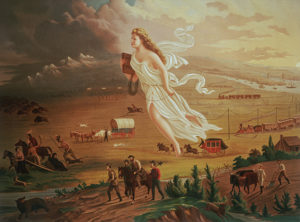
Exceptionalism is the belief that you or your group is so fundamentally superior that you live by a different moral standard than others. Particularly within certain groups—religious groups, groups based on skin color, the wealthy and powerful elites, there is a tendency to think that our superiority makes us only accountable to our own group.
Exceptionalism derives from a particular civilizational or spiritual heritage, political history, and/or geographical location. From the exceptional point of view, the impossibility of replicating the exceptional state makes the realization of these values (like salvation, democracy, self-determination, rights) contingent upon the other becoming like them.
Because the other will never be as exceptional as the exceptionalists, they feel justified to impose their values and understanding of what is good upon others, by force if necessary. Moreover, the exceptionalists do not feel bound by those standards as they claim exclusive insights into a universally valid morality.
White American eceptionalism evolved out of the European Doctrine of Christian Discovery and Domination. The belief that European civilization and culture are superior to any other culture is an example of exceptionalism: no other culture can approach what Europeans (and White Americans) have contributed to the world in terms of religion, music, art, philosophy, economy, laws, and governance. European cultural exceptionalism was expressed during the Age of Discovery and colonialism. White American exceptionalism continues to evolve out of this cognitive and ethical flaw.
The Doctrine of Christian Discovery and Domination was developed by 15th Century European monarchies and the Christian Church as a means of legitimizing the claiming and colonizing of lands outside of Europe, a doctrine that continues to impact Native People around the world. The Church framed the enslavement, genocide, theft of land, and other abuses inflicted upon non-Christians as acts that glorified God because Christian Europe made it possible for Native People to know the love of Christ and salvation.
The Doctrine, one of the very first international law principles, established the ritual of discovery for European sovereigns to automatically acquire property rights in native lands and gain governmental, political, and commercial rights over the indigenous inhabitants without their knowledge or consent. This legal principle was created and justified by the belief in Christian and European superiority over non-Christians and non-European civilizations. The Doctrine continues to define the relationship between Native People and settler governments.
The American states and the United States applied these Discovery and Domination elements to Native People. The U.S. governments actively engaged in genocide of Native People and forced their removal to reservations. The governments actively attempted to destroy Native Peoples’ cultures, legal systems, and governments to erase them. Over the centuries, the United States worked to assimilate Native People into American culture and society, and as one Residential Indian boarding school superintendent stated: “Kill the Indian in him, and save the man.”
The Doctrine is not just a relic of the discovery and settling of land by Europeans in the U.S., Canada, Australia, New Zealand, and South Africa. This white exceptionalism frame of perceiving Indigenous people, their culture, and land claims is still alive and evident in the current laws and policies of the United States and other settler nations. It still restricts Indigenous peoples’ property, governmental, and self-determination rights. These white assumptions of exceptionalism remain dangerous legal and historical fictions within the United States.


